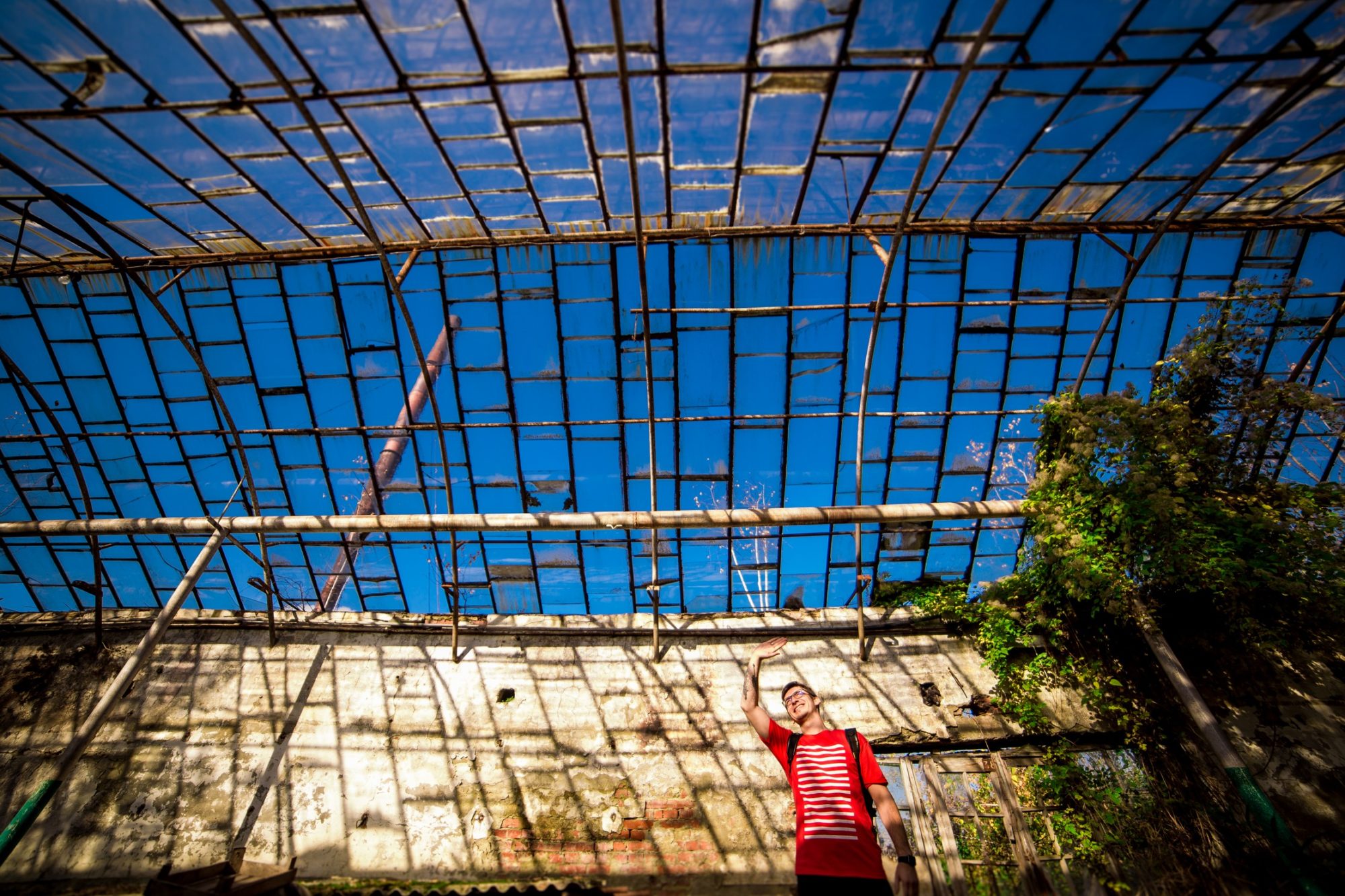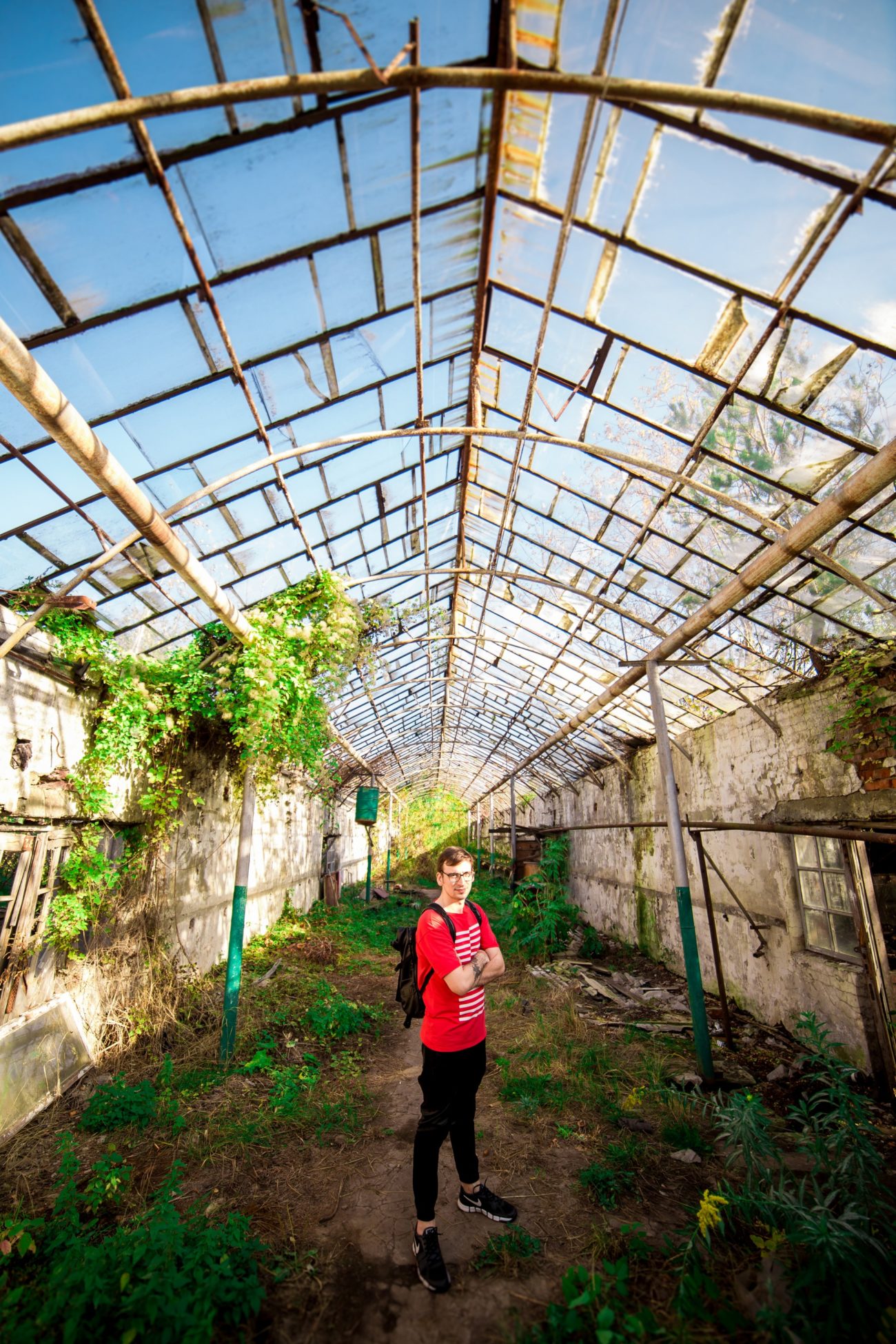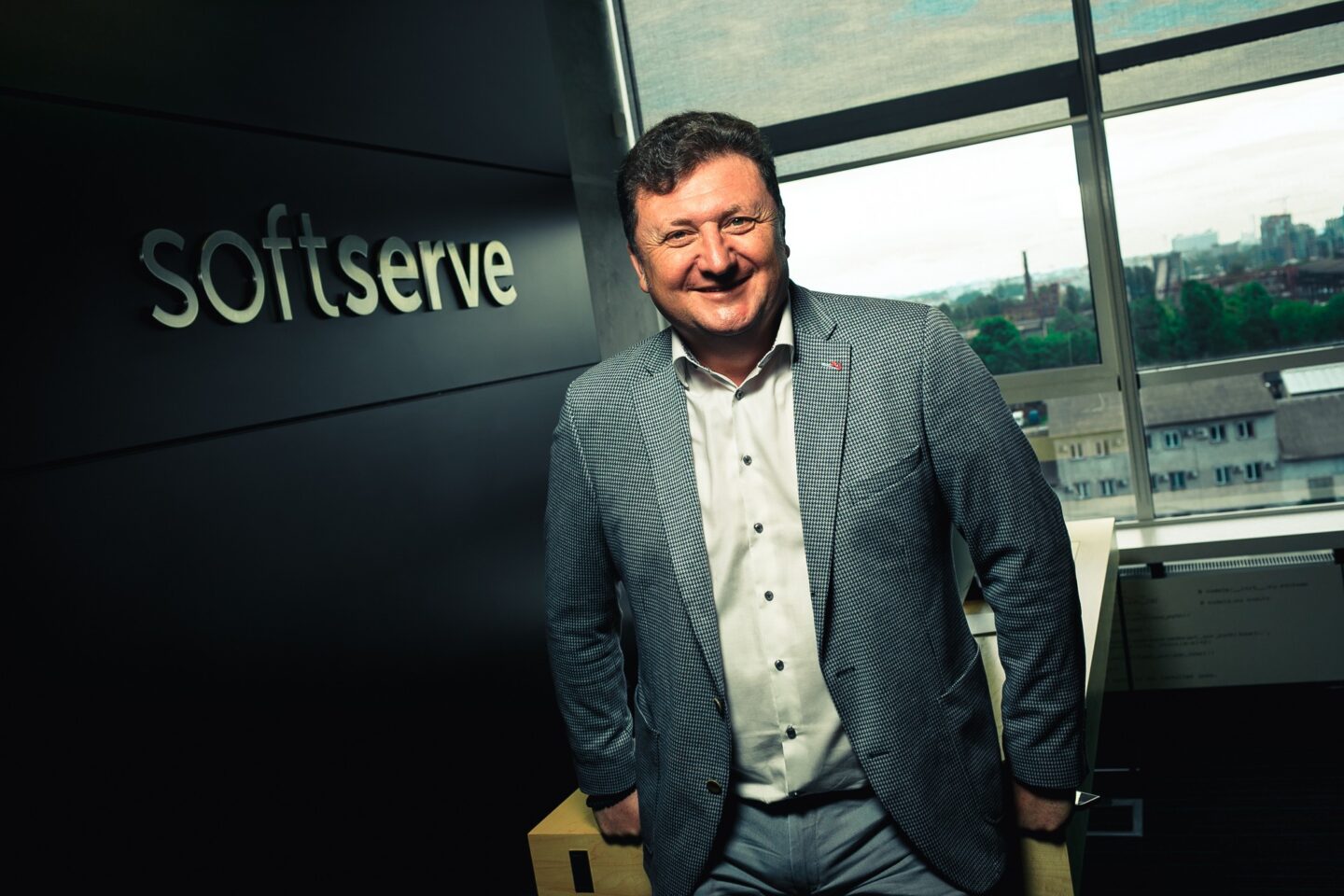[“Technology of success” — a series of interviews with leaders of the most ambitious IT companies in the country. Throughout the year, together with Lviv IT Cluster, we will tell you about entrepreneurs and heads of tech companies in Ukraine, trying to better understand the people who are driving the country forward.]
Now Lviv is often referred to as the “IT city”, “Ukrainian Silicon Valley”, “IT hub of Eastern Europe”. In the last 5 years, the city stopped being associated solely with tourism and coffee.
The IT industry became visible and Lviv established itself as a progressive and technological center of Ukraine. Thanks to such international conferences as IT Arena, the city is also slowly transforming into a tech center of Eastern Europe.
All of this success wouldn’t be possible without people who decided to make their contribution for the good of the city, education, and business. It’s more than 70 leading IT companies, 4 universities and a few dozen of powerful communities.
Lviv IT Cluster CEO Stepan Veselovskyi on how he managed to unite a few dozen multi-million dollar tech companies, his failures, the importance of trust, and why there’s nothing impossible.
As I was preparing for this talk, I looked through your previous interviews, but I still haven’t fully understood your role. Do you work in the IT sphere? Are you engaged in the city development? Or management? How would you determine your current position?
I had the same thoughts. (Smiles) However, I think I’m more closely involved in the IT. When people talk about IT, they instantly think about developers. In fact, 50% of employees working in the industry are developers, the rest — HR, management, sales, design, business analytics etc. People know less about the second part of the industry. However, don’t think we are this “first part”. The “first part” — is business creating software and selling products to clients.
Basically, I’m balancing between IT and city development. Why? Because my work at Lviv IT Cluster is directly influencing the city.
In any case, working at the intersection of industries is more interesting than working in one. Don’t you agree?
It is more interesting. And it’s been discussed a lot already: by working at the intersection, you use the experience of one industry to create added value in another. The IT industry “lives” in all other industries. It’s an industry that helps other industries to develop faster and earn more money. We transfer our experience of the city development into IT and vice versa. It’s valuable.

People often ask what exactly we do. Three years ago, I didn’t have a clear answer to this question, but now I’ve already formed one. We create different projects — from launching new educational programs and conferences to new large-scale infrastructure objects.
You can already feel that this whole process and our work have an impact. We’re not baking a cake, we are indeed changing people’s lives. We’re changing Lviv and soon every citizen will feel it. The work we do now will impact the future of our kids.
To me, we’re talking not about the development of the city, but rather about the development of a special ecosystem.
I hate this word. It’s very “cliched”. Earlier I worked at the City Institute of the Lviv City Council and, honestly, I’m allergic to these words. In state or municipal structures, they are used most often.
They are like filler words. If you want to do something, call it a “platform”. If you have no idea what you want to do, call it an “ecosystem”. On the other hand, it was at the City Institute that I learned to take difficult tasks and accomplish them. This skill can only be developed through successful mentoring. My director back then Oleksandr Kobzarev formed my basic work values, as well as communication and behavior models that allow me to do what I am doing now.
You can already feel that this whole process and our work have an impact. We’re changing Lviv and soon every citizen will feel it
The development of the city consists of many components, and Lviv IT Cluster is a part of the process here. We have construction projects, but can we call ourselves developers? I don’t think so. We create projects needed by our industry.
If we organize conferences, are we event managers? We’re involved in education. We launch new educational programs. But are we an educational institution? No. Our goal is to help universities create them.
We work in the field of intellectual property. In most cases, we own a concept or a brand rather than something physical. Our task is to create sustainable projects that will exist without our participation.
I would like to talk a bit more about the Cluster. One thing is to manage a company consisting of one employee and four participants, another — when you have 16 employees and nearly 70 member-companies… Can you highlight some specific stages of the Cluster’s development? Obviously, it wasn’t easy in the beginning… And it’s probably not very easy now…
If it was very easy, I would have left.
Why?
I would rather do something harder. I’m not the person who likes staying in the comfort zone.
I consider myself an entrepreneur. Right now, I’m not realizing myself as a full-fledged entrepreneur, but that’s who I am deep down. I can work on this skill at the Cluster. We approach most projects from the entrepreneurial point of view since we have to immediately plan their financial sustainability.
We don’t have any subsidies, investments, or grants. Each of our projects has its own business model. So, while I have it, I’m staying.

Why am I looking for challenges? My mom is a teacher, my dad — an engineer. All my life I wanted my family to live well and in prosperity. My parents have put maximum efforts to achieve this. But I always wanted more.
Therefore, I tried to use every opportunity that occurred. While at university, I applied for every possible program. I was not the best student, and I failed in 99% of cases. I have a whole pile of rejection letters at home. (Smiles) Each rejection brought great disappointment. But I moved on and never stopped.
Every company wants to have more entrepreneurial employees. In our current team, everyone is like that.
What would happen if the Cluster didn’t exist?
I’ve already asked myself this question. And I’ve been asked this by the companies that joined Lviv IT Cluster. They asked me what if they don’t join. Now I can say with confidence, that the city’s economy would suffer.
What are the numbers?
When the city strategy of Lviv was being developed in 2008, the Cluster didn’t exist yet. Analysts from Monitor Group calculated that the human capital market in the IT industry was 5000 people.
That’s how many people worked in the industry back in 2010. In 2015, this number reached 15 thousand. We tripled the market. This happened both due to organic and inorganic growth. Why? Because the Cluster invested a lot of money in promoting Lviv as an IT city. People started to come here.
An average salary of an IT specialist in Lviv — is 1736$. These are the people who work, live, and spend money here
An average salary of an IT specialist in Lviv — is 1736$. These are the people who work, live, and spend money here. The Indian IT association NASSCOM counted how many workplaces in other industries creates one workplace in the IT industry. According to their research — four.
According to PwC analysts, last year this number equaled 3,6. Therefore, thanks to IT professionals, the city’s economy is growing. Thanks to the active work of Lviv IT Cluster, the number of such professionals is constantly growing too.
Many people get jobs. In 2015, the city’s budget amounted to 180 million dollars, with 12,5 million being the revenue from the IT industry. It’s quite a lot. Especially, if we understand this is the direct budget of the city. Besides it, there’s also an indirect one — more cars were sold, more apartments were built, more restaurants and coffee shops were opened.
If the Cluster didn’t exist, then at least Lviv wouldn’t become the first city in the IT industry. We have counted the number of IT professionals per 1000 inhabitants and understood that this ratio is the highest in Ukraine.
The city would lose a lot. Not everything, but a significant part. The conference IT Arena, which is one of the largest tech events not only in Ukraine but also in Eastern Europe, wouldn’t exist. We created it completely from scratch.


What are the biggest projects of the Cluster? Which ones are you most proud of?
The most important results for now — are the changes in education. This is something we have been putting a lot of effort into during a couple of years. You can’t fully change something that is completely rotten. Thus, we decided to create something new and quality — with the new curriculum, and modern approaches to marketing and sales.
Last year we launched a degree program in IoT at Lviv Polytechnic National University. In 2017, 4 more programs have been launched. Already 456 students have enrolled in these programs.
Every year 4106 young professionals graduate from IT-focused programs in Lviv. We need four more years to fully modernize tech education in the city. This direction is the biggest and the most complicated one among our other projects.
How do you organize this process?
We start with the development of curriculum. We look for opportunities and try to understand what can be changed in the program. For example, we need a program in Artificial Intelligence. We look for a leader inside a university. It should be someone eager to change the situation. Every big organization has reformers that cannot be stopped. Often, you just need to help them and they will do cool and right things.
Firstly, we find them at a university, then — from the side of the IT industry. If we have found two of such activists — we start the project. Then we find experts that will be developing the curriculum, create a website and build our marketing and communication strategies. Next, we try to win the competition for applicants, enroll students and take care of the technical support of the process. Last year we launched a Bachelor Program in IoT, and now we are finishing building the lab.
Every big organization has reformers that cannot be stopped. Often, you just need to help them and they will do cool and right things
Another large-scale project — IT Arena. In 2013 we decided to organize a big industry-focused conference. I suggested this idea and the Cluster’s Supervisory Board supported it. Back then, I didn’t know what a big public conference was. The biggest thing I have organized before was an event for 50 people. IT Arena, in contrast, has lots of processes, and you have to sell tickets.

The story about the conference — is like a separate life story. (Smiles) The idea was simple — to make the biggest IT conference in Western Ukraine. I didn’t have any experience in big events, so I attended the local ones and watched how they were organized. Then I started to unite the leaders of local communities.
The first conference was divided into twelve streams. Twelve! From the event management point of view — it’s a chaos. (Laughs)
The budget of that conference was very small. Due to political circumstances, we had to change the date of the event twice. I remember that on the first day of the conference, we made mistakes in everything possible. But we understood that we want to learn and move forward.
After the first year, our goal became to make the biggest tech conference in Ukraine. Already in 2015, IT Arena was named the best tech conference in the country according to DOU. It was not enough for us, and we set another big goal — to become the biggest tech conference in Eastern Europe. We made a bigger team, invited foreigners and are approaching the organization more thoroughly every year.
The goal is not just organizing an event. It’s important what we communicate through the conference, what message we send. The conference is just our tool. We’re trying to make Lviv a more prominent location on the tech map of the world.
The goal is not just organizing an event. It’s important what we communicate through the conference, what message we send
Last year, we looked at Alfa Jazz Fest and realized that a really good networking is one of their distinguished features. We understood, that without a cultural component, the conference can’t be a complete product. We can say that we’re organizing a conference, but what we really need is to involve more people in the industry through culture. That is why we started a festival of electronic music. We chose electronic music not by accident — it’s the music created by technologies. Basically, we’re organizing a “confest” — a conference plus a festival.
With the help of the conference we unite more than 2000 attendees, and thanks to the festival attract a few more thousands visitors interested in the tech industry and willing to become a part of this culture. The conference has already been tested on the local market and we’re gradually entering the international one. Our ultimate goal is to organize the biggest tech conference in Eastern Europe. There are not many competitors yet. We can do it in five years.
What about the IT Park project?
Starting in 2016, we have been discussing the problem of offices and infrastructure at the Cluster’s meetings. We say it’s an “IT city”, but where can you see it? Most of the companies have problems with office lease.
There is a demand. The first thing we usually do in such cases — a research. We weren’t competent in construction, therefore we hired one of the world’s leading companies Cushman & Wakefield which deals with real estate analytics. They conducted a survey about the vision of IT Park among the companies located in Lviv.
There have been talks about such a park in Lviv for a while. The city has long wanted to do it but didn’t succeed. We took the initiative and responsibility. Became the leader of the process.
The research confirmed that there’s a market for IT Park in Lviv and helped to visualize it. Because in the beginning, when we asked the company executives how they would see IT Park, everyone answered differently. I understood that we won’t build anything this way, thus, one of the goals of the research was to show the commercial effect for an investor as well as develop a united concept of IT Park.
Cushman & Wakefield conducted the research, we saw the results and decided that the project has to be implemented. We understood that if a typical construction company comes, it would just build new offices. It’s not what we need. We didn’t want to build offices for hypothetical companies, but for us and our needs.

Also, we wanted to change the city visually. We wanted to become visible and create something similar to a science park. We created a concept with a business model. The state is not ready to invest in such projects yet, but working independently from it has its good sides.
I’m not a supporter of the “grant story” that is currently taking place in the EU and in Poland in particular, where everything is subsidized. They build a new theater without knowing whether there is a demand for it. They build a convention center without understanding its business model. I think that the EU financing of Poland will end in 2021, and it would be very interesting to see what will happen to their infrastructure and whether the Polish economy will continue to grow.
We don’t have such inorganic growth, therefore, everything has to be organic. Every project must have an effective business model. IT Park has it. The first challenge is to make the project attractive for investors. Because someone has to invest their money here.
I’m not an urbanist, but in my opinion, one of the biggest problems in Lviv is the fact that the center performs all roles. The center is overloaded with cars, everyone’s trying to rent an office there. All of this creates a collapse. Now I ride a scooter in the center, because it’s impossible to find a car parking during the day. I try not to organize meetings in the center and will never have an office there. Therefore, we also want to solve the urban problem — to create a business center of the city. It will be on Stryiska Street.
Innovation District IT Park — it’s not just offices. It’s the best offices, an underground parking, a university campus. Moreover, there will be around twenty labs accessible for students and scientists from all Lviv universities. For example, a student from a tech faculty of Ivan Franko National University of Lviv will be able to come and work at the lab.
Innovation District IT Park — it’s not just offices. It’s the best offices, an underground parking, a university campus. Moreover, there will be around twenty labs accessible for students and scientists from all Lviv universities

The strategic task is to make this IT Park, not just a building, but also a place that would create additional opportunities for citizens of the city. Next to the university, there will be an accelerator, coworking spaces, a multifunctional center with a gym and pools, a hotel, an entertainment zone and food courts. We estimate that 10 000 employees will be working at IT Park.
With IT Park, the whole Stryiska Street will be revived. Entrepreneurs will open new cafes, banks will expand their networks. In fact, this district will get a new life, because there will be the highest concentration of employees with a 2000 $ salary.
We used not just a developer’s approach, but an analytical one. It’s important to mention, that all office spaces are already pre-booked. We haven’t started the construction yet, but out of 70 000 m2 of the first stage, there are only 5000 left! This is the case when you create a product that is definitely needed by the market. The case when the industry itself creates this product.
In our previous talks with the heads of Ukraine’s biggest IT companies, we have often mentioned Lviv IT Cluster as an organization where win-win principle works. This is something many of us lack. Despite business interests, the companies united, work together and create added value not only for themselves but also for the city. Why, in your opinion, there are not many cases of such a positive cooperation?
Every industry can do this. Recently, I interviewed a talented young man who worked in the agriculture industry but wanted to get a job in IT. I always ask people why do they want that. He answered: “A lot of my friends work in the IT industry. The atmosphere, communication and values are different there”. Meaning, there’s no “Soviet management”. Instead, there is freedom and creativity. He said that’s what he wants the most right now.

In my opinion, that’s the answer to the question why win-win projects succeed in the IT industry. The culture and the atmosphere inside tech companies are completely different from an average Ukrainian business.
After working at the government structures, working in IT looked like a fantasy. (Smiles) Once I asked one of the CEOs why his employees start to work so late (around 11 am). He answered: “I can’t make anyone come at 9 or 10. Because they would simply leave for another company. I have to create such conditions where employees don’t work with strict schedules. They have to enjoy the process, but anyways stick to deadlines and do a quality work”.
Now, most of the processes inside companies are built on trust. I remember, when I was working at the City Council, there were situations when people who were late got caught at the entrance. (Laughs) This freedom gives people the opportunity to look at the competition in a different way.
What is the big idea of the Cluster? When will you say that you have achieved the success planned in the beginning?
I haven’t learned how to put it in one sentence yet. I think that it’s currently helping to build the city of creative industries. We want Lviv to be the city where people are free to create.
Our task — is to create a situation when more and more people working in IT would move to Lviv. We want to create a city attracting students from all over Ukraine because of its tech education, entrepreneurs — for affordable prices and skilled developers. A city of hundreds of IT companies. A city with 100 thousand IT employees.
It’s a city where you can solve any problem from your smartphone. For example, choose a city mayor. It’s a city where respect and understanding come hand in hand. It’s a city where, finally, there’s more glass in architecture. (Smiles)
What’s your role and mission in this process?
My mission is to make all of the above happen. In the long or in the short run — let’s see.
The Cluster is developing rapidly and I’m afraid that at some point I won’t be able to keep up with this speed. I understand that one day I’ll have to make a wise decision and leave my position for someone better. I don’t know when this moment will come, but for now, my task is to make everything possible to bring us closer to the goal.
What does success mean to you? Do you consider yourself a successful person?
Everything is relative. My self-esteem is good. (Smiles) In general, I consider myself successful. At the same time, I’m a bit lazy because I could have achieved much more.
If compared to other people, I’m not very successful. Someone has achieved more in life, others have more competencies. But is this my limit? No. This is just the beginning.
I don’t consider myself the smartest person. The problem of many young entrepreneurs is that they think they are the smartest and capable of everything. This is often not the case. I’m rational and less spontaneous and risky. We have to be able to critically evaluate ourselves. I know all my weaknesses and understand what I lack.
Your advice for young entrepreneurs.
I am very often invited to become a jury member in different competitions, but I usually decline. Sometimes it happens that participants of the competition have more experience than me in certain areas. What can I advise such people?..
If to be more specific, then I advise young entrepreneurs not to waste time doing nonsense. You either do your thing and then tell you succeeded, or don’t do anything. It is not necessary to advertise yourself for no reason.
You have to remember that everyone might be wrong, but everyone can also fix their mistakes. The main thing is to keep trying and work hard

The second thing is reputation. It’s a very valuable thing, but don’t think it’s something that can’t be changed. No one has a perfect life. Unfortunately, our society doesn’t tolerate mistakes and failures. Like everyone else, I also had a few big mistakes, but I realized that they could be fixed. It’s hard, but it’s possible.
You have to remember that everyone might be wrong, but everyone can also fix their mistakes. The main thing is to keep trying and work hard.




